NCERT Solutions for Class 6 Maths Chapter 4 Basic Geometrical Ideas
NCERT Solutions for Class 6 Maths Chapter 4 Basic Geometrical Ideas Ex 4.1
Exercise 4.1
Ex 4.1 Class 6 Maths Question 1.
Use the figure to name:
(a) Five points
(b) A line
(c) Four rays
(d) Five line segments
Solution:
(a) Five points are: O, B, C, E and D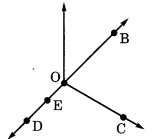
(b) Name of the line is
(c) Four rays are:
(d) Five line segments are:
Ex 4.1 Class 6 Maths Question 2.
Name the line given in all possible (twelve) ways, choosing only two letters at a times from the four given.![]()
Solution:
The given lines can be named as follows: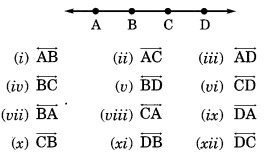
Ex 4.1 Class 6 Maths Question 3.
Use the figure to name:
(a) Line containing point E.
(b) Line passing through A.
(c) Line on which 0 lies.
(d) Two pairs of intersecting lines.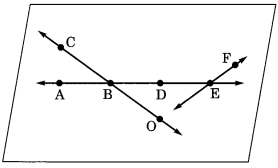
Solution:
(a)
(b)
(c)
(d)
Ex 4.1 Class 6 Maths Question 4.
How many lines can pass through
(a) one given point?
(b) two given points?
Solution:
(a) Infinitely many lines can pass through a given points.
(b) Only one line can pass through two given points.
Ex 4.1 Class 6 Maths Question 5.
Draw a rough figure and label suitably in each of the following cases:
(a) Point P lies on
(b)
(c) Line L contains E and F but not D.
(d)
Solution: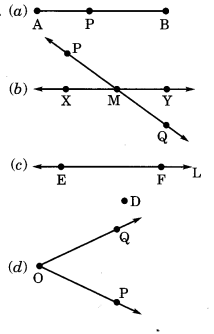
Ex 4.1 Class 6 Maths Question 6.
Consider the following figure of line MN. Say whether following statements are true or false in context of the given figure.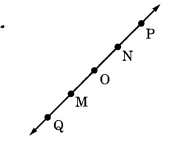
(a) Q, M, O, N, P are points on the line
(b) M, O, N are points on a line segment
(c) M and N are end points of line segment
(d) O and N are end points of line segment
(e) M is one of the end points of line segment
(f) M is point on ray
(g) Ray
(h) Ray
(i) Ray
(j) O is not an initial point of
(k) N is the initial point of
Solution:
(a) True
(b) True
(c) True
(d) False
(e) False
(f) False
(g) True
(h) False
(i) False
(j) False
(k) True










